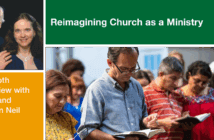Resurrection involves transformation, and to proclaim resurrection hope is to affirm the possibility of change. Ann Michel of the Lewis Center staff sees resurrection hope in the willingness of so many churches to embrace new and innovative approaches to ministry in this time of uncertainty and travail.
Our Lenten journey this year has been dominated by fear and anxiety, disruption and disease, economic uncertainty and loss. Churches are adapting daily to changing circumstances — congregants sheltering in place, suspended worship gatherings, and disrupted patterns of engagement and activity. Under normal circumstances church life can be stubbornly resistant to change. But in the face of these unprecedented challenges, many congregations and congregational leaders have proven surprisingly nimble and adaptive — embracing online worship, digital meeting spaces, electronic giving, social media connections, and even rediscovering the lost art of the telephone conversation.
New patterns and new possibilities
In this time of heightened anxiety, one of our fears is that a crisis of this magnitude could strike the fatal blow to congregations already weakened by declining worship attendance, aging constituents, and troubling giving trends. But what if, instead, this jolt to the system is a necessary wakeup call, opening our eyes to new possibilities, new patterns of relationship, and new ways of being together that other sectors of society embraced long ago?
The response to this crisis has made it abundantly clear that church is not bound by our buildings, as much as we may love our buildings. It has demonstrated that our worship is essential, even when it happens in new and unusual ways. That our relational ties extend far beyond the hour we are together on Sunday mornings. That the support of community surrounds and sustains us when we need it most. And that faith really matters in the face of adversity.
Things are different on the other side of resurrection.
As we prepare to celebrate the joy and apprehend the mystery of the resurrection, one thing we know from Scripture is that things look different on the other side. In John’s Gospel, Mary Magdalene does not recognize the risen Jesus. She mistakes him for the gardener. In Luke’s Gospel, the disciples on the road to Emmaus also do not recognize Jesus. They believe him to be a stranger. Things appear to be different after the resurrection because they are different. Jesus clued us in to this when he revealed to the Sadducees that children of the resurrection neither marry nor are given in marriage. Paul explains that in the resurrection, our perishable physical bodies will be raised as imperishable, spiritual bodies.
There is much we do not understand about the profound miracle of resurrection. But one thing we know for sure is that resurrection involves transformation. And to proclaim resurrection hope is to affirm the possibility of change. Pundits are already predicting that life as we know it will never be the same after the COVID-19 crisis. And life in the church will probably never be the same either. But maybe that’s not such a bad thing.
We will not die. But we will all be changed.
Resurrection hope is more than a security blanket or a blind faith that God will make things right. It affords us new ways of seeing and new ways of being. It is the assurance of transformation, new life, and God’s presence in changing circumstances. This year, we stand in wait of Easter dawn in a time of great uncertainty and travail, but also in faith that God is leading us to a new day. “Listen, I will tell you a mystery! We will not all die, but we will all be changed.” (1 Cor. 15:51)
Related Resources
- Leading the Church in the Face of Coronavirus by Bill Owen
- Staying Connected in a Time of Social Distancing by Doug Powe







